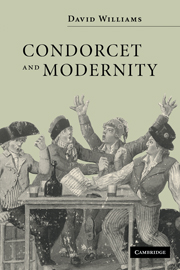Book contents
- Frontmatter
- Contents
- Acknowledgements
- References and abbreviations
- Introduction
- 1 Profile of a political life
- 2 Human nature and human rights
- 3 The civil order
- 4 Managing enlightenment
- 5 Reform and the moral order
- 6 New constructions of equality
- 7 Justice and the law
- 8 Representative government
- 9 The economic order
- 10 Managing the Revolution
- Conclusion: the human odyssey
- Bibliography
- Name index
- Subject index
7 - Justice and the law
Published online by Cambridge University Press: 22 September 2009
- Frontmatter
- Contents
- Acknowledgements
- References and abbreviations
- Introduction
- 1 Profile of a political life
- 2 Human nature and human rights
- 3 The civil order
- 4 Managing enlightenment
- 5 Reform and the moral order
- 6 New constructions of equality
- 7 Justice and the law
- 8 Representative government
- 9 The economic order
- 10 Managing the Revolution
- Conclusion: the human odyssey
- Bibliography
- Name index
- Subject index
Summary
CIVIL LAWS AND CIVIL RIGHTS
Condorcet wrote prolifically on the natural origins of justice and the law. Surprisingly, however, he did not in the end bring his thoughts together in a single systematically argued work dedicated exclusively to the subject of legislation and the art of jurisprudence, although from the evidence of manuscript fragments it is clear that he did plan such a work. Had he written it, he would certainly have paid some attention to the natural setting against which the evolution of civil and criminal law codes could be envisaged, and the relationship of this natural setting to the authenticating principles of law-making and law-enforcement in modern nation-states. As we have seen, natural communal life originated, in Condorcet's view, in the interaction of pain and pleasure experienced through the senses by the individual organism with the external world to produce an awareness of communal contexts and needs. From this sensation-based awareness of communal need the natural order retained a measure of authority in the process of transition from nature to the civil order. The immutable laws of nature, ‘too often unrecognised by reason and universal law’, were still relevant to the formulation of moral and judicial codes. The dispensations of natural law continued to underpin those codes, and conferred ultimate legitimacy on human rights and needs.
- Type
- Chapter
- Information
- Condorcet and Modernity , pp. 172 - 194Publisher: Cambridge University PressPrint publication year: 2004

